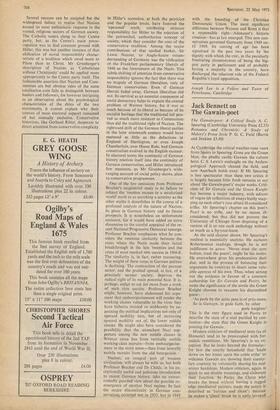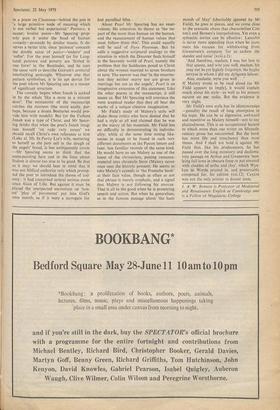Jack Bennett on The Gawain-poet
At Cambridge the critical weather-vane veers from Speirs to Spearing. Gone are the Green Man, the phallic castle. Gawain the culture hero. C. S. Lewis's onslaught on the Anthro-
pological Approach cleared the field, and now Auerbach holds sway. If Mr Spearing is less spectacular than these two critics it is largely because little fresh remains to say about 'the Gawain-poet's' major works. Criti- cism of Sir Gawain and the Green Knight has become a major industry, with editors of vogue-ish collections of essays busily snap- ping up each other's (too often) ill-considered trifles. Mr Spearing's chapter on this poet's Pearl is no trifle, and by no means ill- considered; but that did not prevent the University of Chicago from disposing of a version of it to one such anthology without so much as a by-your-leave.
As the said chapter shows, Mr Spearing's
method is essentially analytic. He eschews Robertsonian readings, though he is not indifferent to genre. 'Never trust the sym- bolism, trust the poem', might be his motto. He everywhere gives his predecesiors their due; and in the process of balancing their arguments he contrives to insert some valu- able apercus of his own. Thus, when setting out the evidence in favour of a common authorship for Sir Gawain and Purity, he notes the significance of the simile the Green Knight chooses to reassure his discomfited guest:
`As perle by the quite peas is of prys more, So is Gawayn, in gode faith, by other
gode knightes' This is the very figure used in Purity to describe the state of a soul purified by con- fession—the state that the Green Knight is positing for Gawain.
Modern criticism of mediaeval texts (as of Homeric) tend to be preoccupied with for- mulaic repetitions. Mr Spearing's is no ex- ception. But he looks beyond the formulas :
for him the courtly household that `knele down on her knees upon the colde crthe' to welcome Gawain are showing their exemp- lary courtesy by voluntarily sharing his mid- winter hardships. Modern criticism, again, is quick to see double meanings, and elaborate their function. In Purity the Christ who breaks the bread without leaving a ragged edge (mediaeval painters made the point) is described as 'curious and clean': because he makes a 'clean' break he is aptly invoked
in a poem on Cleanness—behind the pun is 'a large primitive node of meaning which is not verbal but experiential.' Patience, a neater, livelier poem—Mr Spearing prop- erly puts it under the head of human comedy—proceeds by similar means. It de- serves a better title, since 'patience' conceals the double sense of patior—'endure' and 'suffer'. For the poet himself (as for Lang- land) patience and poverty are 'fettled in one form' in the Beatitudes, and he uses the same verb to describe Gawain's armorial interlocking pentangle. Whatever else that pattern symbolises, it is an apt device for the poet whom Mr Spearing sees as a master of significant structure.
The comedy begins when Jonah is sucked in by the whale 'like a mote in a minster door'. The miniaturist of the manuscript catches the moment (the more easily, per- haps, because a dozen Bestiaries would pro- vide him with models). But for the Fathers Jonah was a type of Christ, and Mr Spear- ing thinks that when the poet's Jonah imag- ines himself 'on rude rwly torent' we should recall Christ's own reference to him (Luke xi. 30). In Purity Lot's wife, muttering to herself as she puts salt in the dough of the angels' bread, is less ambiguously comic —Mr Spearing seems to think that the scene-painting here and in the lines about Sodom is almost too true to be good. Be that as it may. we should bear in mind that it was not biblical authority only which promp- ted the poet to introduce the theme of sod- omy; it had concerned several serious poets since Alain of Lille. But against it must be placed the unexpected encomium on 'hon- est' play of paramorez' put into God's own mouth, as if it were a surrogate for lost paradisal bliss.
About Pearl Mr Spearing has no reser- vations. He conceives its theme as 'the im- pact of the more than human on the human, and the reassessment of human values that must follow from this'. This could equally well be said of Piers Plowman. But he adds a suggestive scriptural analogy to the situation in which the Dreamer finds himself in the heavenly world of Pearl, namely the problem that the Sadducees posed to Christ about the woman married to seven brothers in turn. The answer was that 'in the resurrec- tion they neither marry nor are given in marriage but are as the angels'. Pearl is an imaginative extension of this statement. Like the other poems in the manuscript, it still teases us. But Mr Spearing will convince the most sceptical reader that they all bear the marks of a unique creative imagination.
Mr Field's study of Malory's style will shake those critics who have denied that he had a style at all and claimed that he was at the mercy of his materials. Mr Field has no difficulty in demonstrating its individu- ality, while at the same time noting like- nesses in usage to be found in such very different documents as the Paston letters and later, less familiar records of the same kind. He would have us see Malory as one of the latest of the chroniclers, putting romance- material into chronicle form (Malory never once uses the historic present). He seems to take Malory's appeals to 'the Frensche book' at their face value, though as often as not that phrase is merely emphatic, and a signal that Malory is not following his sources. That is all to the good when he is presenting speech and action. But when he generalises, as in the famous passage about 'the lusty
month of May' (charitably ignored by Mr Field), he goes to pieces, and we come close to the syntactic chaos that characterises Cax- ton's and Berners's interpolations. Yet even a syntactic stutter can be effective: Lancelot is never more appealing than when he stam- mers his excuses for withdrawing from Gwenevere's company 'for to eschew the slander and noise' (xviii.c.1):
'And therefore, madam, I was but late in that queste, and wite you well, madam, hit may nat be yet lyghtly forgottyn, the hyghe servyse in whom 1 did my dyligente labour. Also, madame, wyte you well ...'
If Malory wrote to be read aloud (as Mr Field appears to imply), it would explain much about his style—as well as his present success on sec radio. But the evidence is very slight.
Mr Field's own style has its idiosyncrasies —possibly the result of long absorption in his topic. He can be as digressive, awkward and repetitive as Malory himself—not to say platitudinous. This is an occupational hazard to which more than one writer on fifteenth- century prose has succumbed. But the book has more life and trenchancy than most theses. And I shall not hold it against Mr Field that, like his predecessors, he has passed over the long monitory and declama- tory passage on Arthur and Gwenevere 'now lying full lowe in obscure fosse or put covered with cloddes of erthe and clay', which Wyn- kyn de Worde printed in, and presumably composed for, his edition (xxi.12). Caxton was not the only printer to doctor texts.
J. A. W. Bennett is Professor of Mediaeval and Renaissance English at Cambridge and is a Fellow of Magdalene College



































 Previous page
Previous page